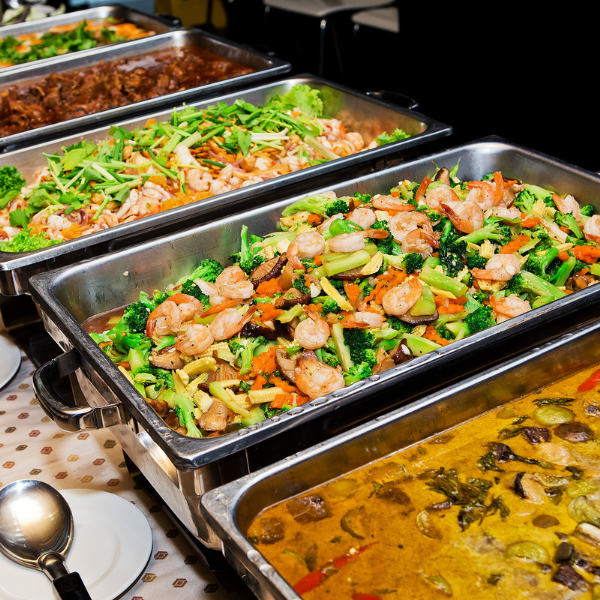Catering is a thriving industry, and one of its most promising segments is drop-off catering. Whether you're starting a new catering venture or looking to expand your existing business, a well-executed drop-off catering program can be a lucrative addition to your services. In this comprehensive guide, we'll explore the key elements of launching a successful drop-off catering program.
What Is Drop-Off Catering?
Drop-off catering is a service where prepared meals are delivered to a specific location. It differs from traditional catering because it doesn't require servers or setup at the event. Ideal for casual events, office meetings, small gatherings, or parties, drop-off catering is all about convenience and affordability.
The meals are usually pre-cooked and packed in disposable containers, requiring minimal effort from the customer. Depending on the provider and customer requirements, the dishes can range from sandwiches and salads to more sophisticated meals. The focus is on fresh, quality food delivered promptly and efficiently, transforming any event into a stress-free, enjoyable experience.

How Do You Start A Drop-Off Catering Business?
Define Your Niche
Prior to venturing into drop-off catering, pinpointing your niche is crucial. This entails making essential decisions on various things concerning your business. By doing so, you can effectively shape your catering brand and design an appropriate menu.
- Specialization: The catering industry is vast, and defining your niche is crucial. Decide on the type of cuisine you want to specialize in. Specialization not only helps you stand out but also allows you to develop expertise in your chosen field.
- Target Audience: Identify your target audience. Understanding your audience will guide your menu, pricing, and marketing efforts.
- Competition Analysis: Research competitors in your chosen niche. Assess their strengths and weaknesses to identify opportunities for improvement.
Legalities And Licensing
- Health Regulations: Familiarize yourself with local health regulations and food safety standards. Ensure your kitchen and food preparation processes meet these standards to protect the health of your customers and maintain a positive reputation.
- Licensing and Permits: Obtain the necessary licenses and permits required to operate a catering business in your area. This may include food service permits, business licenses, and health department certifications. Compliance is crucial to avoid legal issues.
- Insurance: Consider obtaining liability insurance to protect your business in case of accidents or food-related illnesses. Insurance provides financial security and peace of mind.
Develop A Unique Brand Identity
- Logo and Branding: Design a memorable logo and create a cohesive brand identity. Your logo should reflect the essence of your catering business, whether it's elegance, creativity, or a specific theme.
- Slogan: Craft a catchy and meaningful slogan encapsulating your brand's mission or uniqueness. A well-crafted slogan can stick in people's minds and differentiate you from competitors.
- Online Presence: Establish an online presence through a professional website and active social media profiles. Showcase your menu, past events, client testimonials, and high-quality images of your dishes. An appealing online presence can attract potential clients and build credibility.
Build Relationships
- Networking: Attend industry events, join local business associations, and connect with event planners, venues, and suppliers. Building a robust professional network can lead to valuable referrals and collaborations.
- Client Relationships: Nurture relationships with your clients. Provide exceptional service and communicate clearly to build trust. Satisfied clients are more likely to become repeat customers and recommend your services to others.
Menu Development
- Diverse Menu: Craft a varied and appealing menu that aligns with your niche and target audience. Consider dietary restrictions, food trends, and cultural preferences when designing your offerings.
- Customization: Offer customizable options to cater to various preferences and dietary needs. Allow clients to tailor their menus to create a personalized dining experience.
- Tasting Events: Consider hosting tasting events or menu showcases to introduce your offerings to potential clients. This allows them to experience your food firsthand and can lead to bookings.
What Factors Lead To A Successful Drop-Off Catering Service?
Exceptional Food Quality
- Fresh, High-Quality Ingredients: Using the freshest and highest-quality ingredients is non-negotiable. It's what sets the foundation for delicious, memorable dishes. Source ingredients from reputable suppliers and maintain strict quality control in your kitchen.
- Presentation: Presentation is not just about taste; it's also about how the food looks. Pay meticulous attention to the presentation of each dish, ensuring it's visually appealing. Well-plated dishes can enhance the dining experience and impress your clients and guests.
- Consistency: Consistency in food quality is paramount. Clients expect the same level of excellence every time they order from you. Develop and adhere to standardized recipes and cooking procedures to ensure that every dish meets your high standards consistently.
Professional Staff
- Competence: Hire and train skilled and knowledgeable staff in their respective roles. This includes chefs executing your menu flawlessly, servers providing attentive and efficient service, and delivery drivers handling food with care during transit.
- Reliability: Reliability is key in the catering industry. Your staff should be dependable and punctual, ensuring that orders are prepared, delivered, and served on time. Reliability builds trust with your clients and minimizes the risk of disappointing them.
- Customer Interaction: Staff interacting directly with clients must possess excellent interpersonal skills. They should be courteous, attentive, and responsive to client needs and special requests. Positive interactions can leave a lasting impression and lead to repeat business.
Efficient Logistics
- Reliable Transportation: Your catering operation relies on transportation to deliver food to various locations. Invest in reliable vehicles that can maintain the desired food temperatures during transit. Regular maintenance and checks are crucial to prevent breakdowns.
- Appropriate Packaging: Packaging is crucial in maintaining food quality during transportation. Use insulated containers and packaging designed to keep hot dishes hot and cold dishes cold. Properly sealed containers also prevent spills and maintain food hygiene.
- Timely Delivery: Timeliness is essential in drop-off catering. Develop efficient delivery routes and schedules to ensure that food arrives at the venue at the agreed-upon time. Late deliveries can disrupt events and lead to customer dissatisfaction.
Stellar Customer Service
- Responsiveness: Respond promptly to client inquiries and requests. Whether it is answering questions, providing quotes, or addressing concerns, timely responses demonstrate your commitment to excellent customer service.
- Attentiveness: Pay close attention to each client's specific needs and preferences. Tailor your services to meet their expectations, whether customizing menus or accommodating dietary restrictions.
- Special Requests: Be willing to go the extra mile to accommodate special requests and unique event requirements. Flexibility and a can-do attitude can set you apart in a competitive market.
Pricing Strategy
- Cost Considerations: Calculate your costs accurately, including food costs, labor, overhead, and other expenses. Your pricing strategy should cover these costs and allow for a reasonable profit margin.
- Market Analysis: Research the local catering market to understand pricing trends and your competitors' rates. Your prices should be competitive while still reflecting the quality and value of your services.
- Transparency: Be transparent with clients about your pricing structure and any additional charges. Transparency builds trust and helps clients understand the value they receive for their investments.
What Makes A Successful Caterer?
A successful caterer possesses a blend of creativity, adaptability, attention to detail, and effective marketing skills. These qualities help them stand out in a competitive market and ensure they consistently deliver exceptional culinary experiences to their clients.
Creativity
- Innovative Menu Ideas: Successful caterers don't just offer standard dishes; they continuously innovate their menus. They experiment with unique ingredients, flavors, and culinary styles to create dishes that stand out. This creativity can leave a lasting impression on clients and make them more likely to return.
- Artful Presentation: Beyond taste, presentation is essential. Caterers with a knack for presentation can turn a meal into an experience. They pay attention to plating, garnishing, and the overall aesthetics of each dish, making it visually appealing and Instagram-worthy.
- Customization: Creativity extends to customization. Caterers who offer customizable menus can cater to various tastes and dietary restrictions. This flexibility shows a commitment to meeting individual client needs.
Adaptability
- Keeping Up with Trends: The catering industry is constantly changing. Successful caterers stay informed about the latest culinary trends, dietary preferences, and food technology. They adapt their menus and services to reflect these changes, ensuring they remain relevant in a competitive market.
- Technology Integration: Caterers who embrace technology streamline their operations. This includes implementing online ordering systems, customer relationship management (CRM) software, and efficient communication tools. Technology enhances customer convenience and boosts operational efficiency.
Attention To Detail
- Order Accuracy: Mistakes in catering can lead to client dissatisfaction. Pay meticulous attention to detail when taking orders, preparing food, and managing event logistics. They triple-check orders, timelines, and setups to prevent any hiccups during an event.
- Timeliness: Punctuality is crucial in catering. Ensure that food arrives at the venue on time, is served promptly, and adheres to the agreed-upon schedule. Being reliable in this aspect builds trust with clients.
- Setup and Presentation: Attention to detail extends to the setup and presentation of the catering. Create visually appealing displays and pay close attention to the clients' special customization requests. This meticulousness enhances the overall dining experience.
How To Make Your Drop-Off Catering Business Unique?
- Customizable Menus: To be unique, a caterer must recognize that every event and client is unique. They offer customizable menus that allow clients to tailor their catering experience to their specific preferences and dietary requirements. This personalization can include options for various cuisines, portion sizes, and special dietary considerations.
- Local And Sustainable Sourcing: Embracing sustainability involves sourcing ingredients locally and choosing suppliers who adhere to eco-friendly practices. Use seasonal, locally sourced produce and sustainable proteins. This not only supports the local economy but also reduces the carbon footprint of the catering business.
- Eco-Friendly Packaging: Besides sustainable sourcing, caterers committed to eco-friendliness use environmentally friendly packaging materials. These choices reduce waste and demonstrate a commitment to responsible business practices.
- Transparency and Marketing: Sharing stories about local partnerships, sustainable sourcing practices, and eco-conscious initiatives can resonate with environmentally-conscious clients and set the business apart from competitors.
- Online Ordering Systems: Invest in user-friendly online website ordering systems to enhance customer convenience. These systems allow clients to browse menus, place orders, and even make payments online, streamlining the ordering process.
- Customer Relationship Management (CRM): Implementing CRM software helps caterers manage client relationships more effectively. It allows them to track client preferences, manage communications, and provide personalized service based on client history. A well-maintained CRM can lead to repeat business and referrals.
- Efficient Communication Tools: In the fast-paced catering industry, efficient communication is key. Utilize messaging apps or email to coordinate with clients, suppliers, and their teams. Clear and timely communication ensures that events run smoothly.
Top 6 Products for Successful Drop-Off Catering
To run a successful drop-off catering business, utilizing the right products and tools is essential. Here, we've outlined the top five products that can make all the difference in ensuring efficiency, quality, and customer satisfaction.
-
Insulated Food Carriers
Insulated food carriers are essential for preserving the ideal temperature of your dishes. Available in various sizes and materials, these carriers maintain the freshness and quality of your food until it reaches its destination. Some carriers include options for hot and cold compartments, allowing you to cater to varied meal requirements and ensuring safe handling efficiently.
-
Sustainable And Aesthetically Pleasing Packaging
Today's customers are becoming increasingly conscious about environmental sustainability, and catering businesses are no exception. Providing eco-friendly packaging from biodegradable or compostable materials can attract environmentally conscious clients. Additionally, choosing visually appealing and functional packaging enhances the presentation and improves the overall experience for your clients.
-
High-Quality Disposable Cutlery
Enhance your catering service with sophisticated disposable cutlery that delivers a premier feel without sacrificing convenience in setup and post-event tidying. Set yourself apart from competitors by selecting environmentally responsible materials. This commitment to style and sustainability will showcase your business's exceptional qualities and environmental mindfulness.
-
Premium Disposable Plates
Consider high-grade, tasteful plates that not only facilitate speedy setup and post-event cleanup but also elevate your clients' dining experience. Their superior design and finish articulate a high-end appeal, causing your service to stand out.
-
Portable Beverage Dispensers
Keeping beverages at their ideal temperature is crucial to complete meal solutions. Portable beverage dispensers with thermal insulation can cater to all your drink-serving needs, whether hot or cold. These dispensers are available in different capacities, and some even feature separate compartments for ice or multiple beverages, which ensures versatility in your offerings and streamlines the service.
-
Labeling Equipment And Products
An organized and well-labeled system enhances your brand image and helps you comply with industry regulations. Providing informative and attractive labels for each dish can cater to diverse customer requirements, including allergen information, heating instructions, or meal components. A well-labeled product is essential for a great customer experience and can contribute significantly to the success of your drop-off catering business.
Investing in these top products will boost your drop-off catering program's efficiency, effectiveness, and reputation. The result will be a seamless operation, an excellent client experience, and the potential to stand out in a competitive market.
Success Recipe for Drop-Off Catering
Launching a successful drop-off catering program requires a strategic approach, dedication to quality, and a commitment to customer satisfaction. You can build a thriving catering business by defining your niche, adhering to legal requirements, and focusing on exceptional food quality and service. Remember to stay adaptable, innovative, and environmentally conscious to stand out in this competitive industry. With the right ingredients, your catering venture can leave a lasting impression on clients and pave the way for long-term success.








